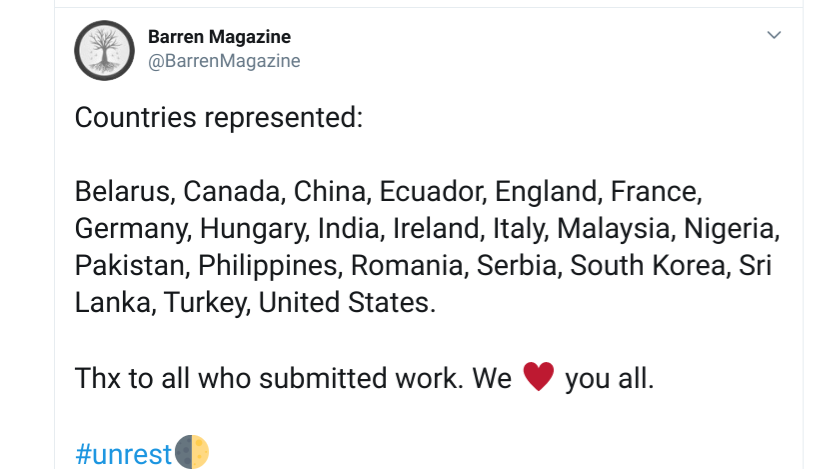Barren Magazine: New Issue Release
Online literary journals like Barren Magazine offer many opportunities to give back to the community.
James McAdams | August 10, 2020
Over the weekend, the U.S.-based literary journal I work for released it’s 15/16th issue, a double issue with the theme of “Fallow/Unrest.” “Unrest” made me feel proud to be a part of something larger, an increasingly rare feeling in America these days. At least for me. And not just America, speaking of which:

What I Learned at Barren Magazine
I joined the Barren masthead in October of 2018 as Flash Fiction Editor. The same cliches they say about teaching, i.e. that the teacher always learns more than the student, also applies to the world of editing
Recognizing Your Own Writing Flaws
In my practice as an editor, I’ve become aware of a plethora of blind spots, errors, infelicities, and crushingly banal plots I’ve since removed from my writing. For instance, it’s almost impossible for me to read something without dialogue. That’s the way to make your story stand out. I hate to repeat “show, don’t tell” but I guess I am. Secondly, witty titles and clever jokes don’t work. Don’t try to be funny unless you’re certain you are. Finally, childhood memories and dreams are only interesting to the writer, not the reader. I’ve cut all of this out of my work.
The Morality of Editing
But the more interesting result of my almost-two years of editing involves morality. Why would editing exercise before-dormant ethical muscles? The answer has its origins in my observations in college writing workshops. Most of the students only paid attention the day their work was getting critiqued and didn’t offer anything in return in the form of critiques or feedback to others. This is simply being selfish, or weak: lacking the ability to climb over the wall of self and rest comfortably in the gardens of other minds and psyches. Even reading something you’re not into, you still have the ability to concentrate and try to lean into that world and those characters the way you should lean into the world of your family, always trying to see the best in them. The best editors are mind-readers, in a sense.
Writing Good Rejection Letters
Writing rejection letters is another prominent feature of editing, which I discussed before. I’m not proud of much, but I am proud that in my almost-two years I’ve replaced form rejection letters with actual real person-to-person notes. Oddly enough, I receive more shows of appreciation and gratitude from authors receiving these personalized rejections than I do from authors whose work I accept.
If any of this sounds appealing to you, now is as good a time as ever to research online literary magazines/journals. Now being a good time because so many of us are still in lockdown. Editing isn’t the only skill, either. You could also volunteer as a social media manager, website designer, proofreader, or grant manager. You’ll become a better writer, you’ll meet amazing people from all across the world, and you’ll feel less alone. I recommend it as highly as I can recommend anything I’ve ever done. In the words of David Foster Wallace, “I wish you way more than luck.”


